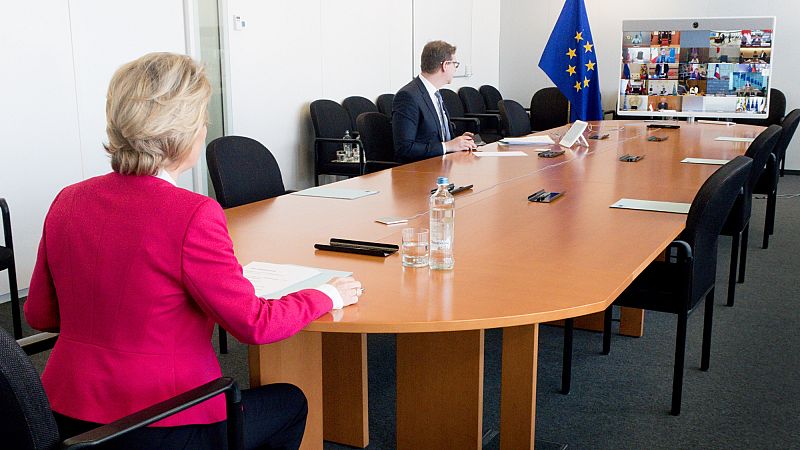
Representatives of pharma companies and trade organisations warned European Commission President Ursula von der Leyen to seek a negotiated settlement with the US over tariffs or face supply chain difficulties, sources say.
They called on the EU executive to reduce non-tariff barriers in the sector during a video call on Tuesday, according to sources familiar with the discussion.
The pharmaceutical sector narrowly avoided being targeted in the latest round of tariffs under former President Trump, thanks to exemptions granted last week.
However, the Commission has warned that tariffs could still be imposed in the future.
Major European pharmaceutical companies including Denmark’s Novo Nordisk - maker of the weight-loss drug Ozempic, hugely popular in the US - alongside Germany’s Bayer and France’s Sanofi among others including the Swiss firm Roche joined the video discussion, the sources said.
US companies operating in Europe were not invited to the meeting, according to the sources, despite their significant presence on the continent.
Trade associations representing the sector also participated, including the EU pharmaceutical lobbies EFPIA and Eucope, as well as Medicines for Europe representing the generics sector and EuropaBio representing biotech companies.
Concerns over tariffs
The Commission said the idea for what it described as a 'strategic dialogue' was to collect industry feedback and identify potential responses to any future actions by the US.
Strong concerns were voiced about the wide-ranging consequences of US tariffs, according to the sources, along with warnings of harm to both European and American patients as a result of disruption to globally integrated supply chains and loss of availability of vital medicines.
Among the most vulnerable to such tariffs is Ireland, which hosts significant manufacturing operations for US pharmaceutical giants like Pfizer, Johnson & Johnson, Eli Lilly, Bristol-Myers Squibb, and AbbVie. Other key pharmaceutical and biotech exporters include Denmark, Belgium, and Germany.
In 2024, pharmaceuticals represented the largest sectoral import from the EU to the US, reaching a total of $127 billion (€117 billion). That trade flow is now at risk of disruption, with potentially severe consequences for patients and businesses alike.
Call participants expressed strong support for the Commission’s commitment to seeking a negotiated solution with Washington. They also emphasised the importance of reducing non-tariff barriers to foster a more cooperative and competitive transatlantic pharmaceutical market, the sources said.
“Even with the current exemption, any tariffs applied would have a significantly negative impact on this innovative sector and on patients, due to the global nature of supply chains,” said EuropaBio in a statement after the meeting.
EFPIA warned that imposing tariffs would reduce incentives to invest in Europe and encourage companies to shift operations to the US. To remain competitive, Europe must strengthen, not weaken, its intellectual property framework, said EFPIA member CEOs in a joint statement.
A new strategic dialogue begins
The meeting was the first such strategic dialogue the Commission has held with the pharmaceutical sector.
Such dialogues have become a hallmark of the EU's approach to sectoral policymaking, initially introduced during the recent farmer protests to foster inclusive conversations and reduce polarisation but then exported to other industries such as cars and steel, and even to address water resilience.
The European Commission confirmed that it will continue to stay in close contact with the industry to ensure the protection of European patients, workers, and businesses during this volatile period – signalling the beginning of a closer partnership.
The establishment of this channel could also pave the way for reopening discussions on the EU’s pharmaceutical package, which is currently stalled in the EU Council.
Call participants explicitly called for simplification of regulation, in particular for protection of intellectual property, a regular bone of contention in the revision of the EU pharmaceutical rules.







